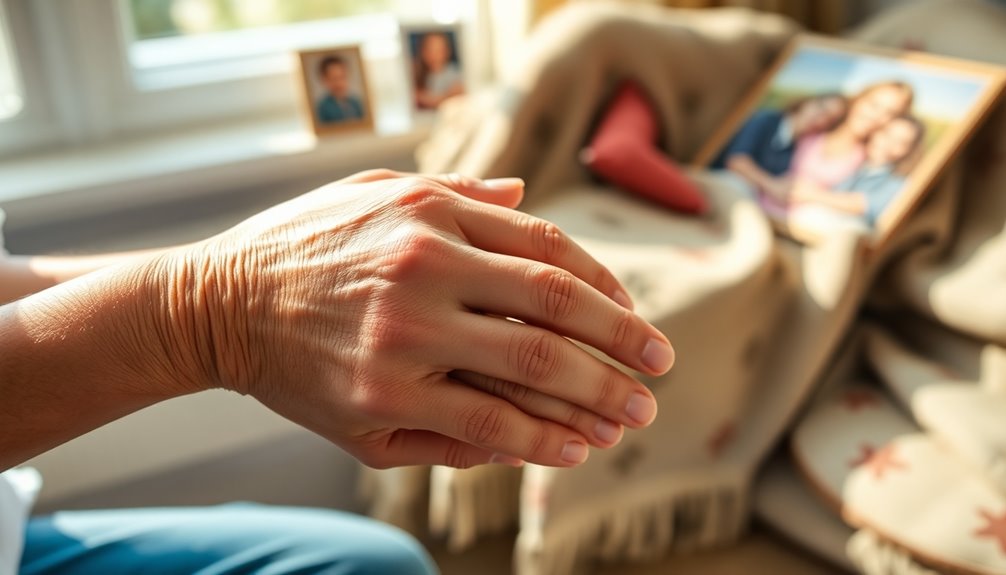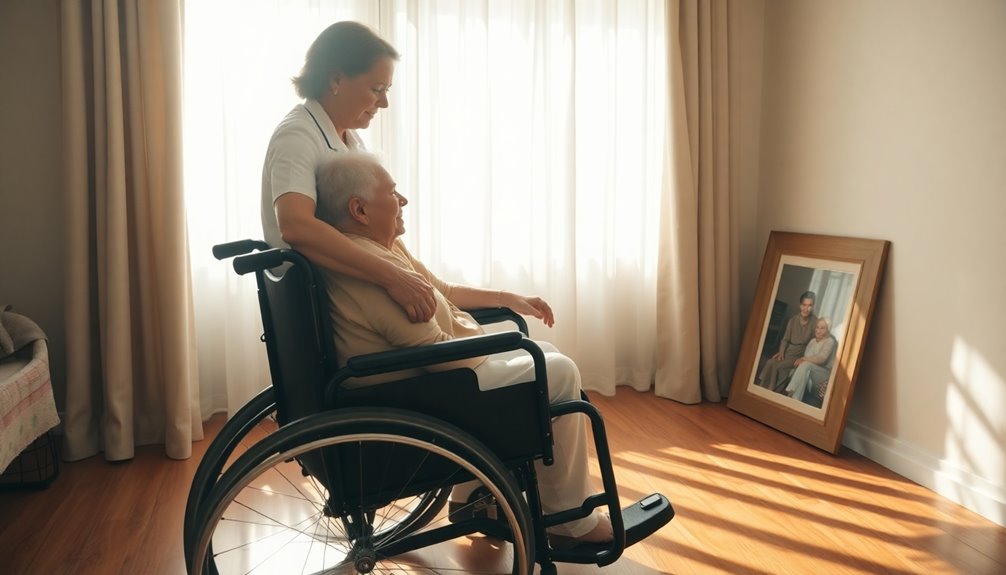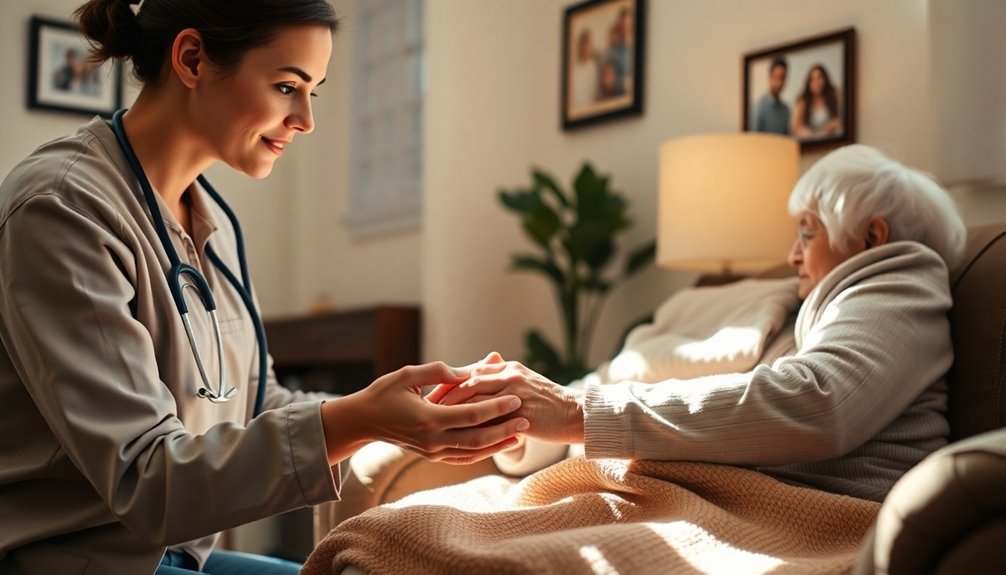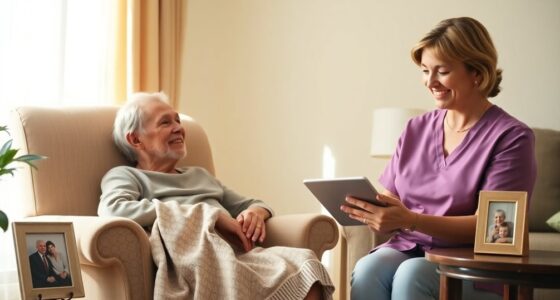Caregiving experience involves providing daily support to individuals with health-related needs, such as bathing, dressing, and meal preparation. It helps you develop essential skills like empathy, communication, and problem-solving. Many healthcare programs recognize caregiving as valuable clinical experience, as it involves emotional support, health monitoring, and care documentation. This role not only fosters personal growth but also enhances your understanding of diverse cultural perspectives. There’s much more to explore about its profound impact on your development.
Key Takeaways
- Caregiving experience involves assisting individuals with daily health-related needs, such as bathing, dressing, and meal preparation.
- It fosters essential skills like empathy, communication, and problem-solving through direct patient interactions.
- Caregiving is recognized as relevant clinical experience by many healthcare programs, enhancing candidates’ qualifications.
- Emotional and psychological aspects, including stress and personal growth, are integral to the caregiving experience.
- Engaging with diverse cultural backgrounds in caregiving promotes cultural competence and enriches understanding of social contexts.
Understanding Caregiving Experience

Understanding the caregiving experience is essential, especially if you’re considering a career in healthcare. This experience involves assisting individuals with health-related needs, focusing on daily activities like bathing, dressing, and meal preparation.
Engaging in caregiving helps you develop valuable interpersonal skills and empathy, as you learn to understand patient needs more deeply. You’ll also gain knowledge about medical conditions, medications, and health monitoring, all of which are beneficial for your future clinical practice.
Many healthcare programs recognize caregiving as relevant clinical experience, particularly when it includes direct patient interaction. Additionally, you’ll sharpen your problem-solving skills and learn to manage challenging situations, both critical competencies in any clinical environment.
Embrace this experience; it’s a solid foundation for your healthcare career.
Key Responsibilities of a Caregiver

As a caregiver, you take on essential daily care duties that include helping with bathing, dressing, and meal preparation.
You also provide emotional support, offering companionship that can uplift your client’s spirits.
These responsibilities not only enhance their quality of life but also foster a strong bond between you and those you care for.
Daily Care Duties
While providing care, you’ll find that daily duties encompass a variety of essential tasks aimed at guaranteeing the comfort and safety of those you support. Your primary responsibilities include assisting with daily living activities, medication management, and mobility support. Keeping accurate documentation of care activities is also critical. Regular health screenings can further enhance the well-being of those in your care by identifying potential health issues early on.
| Task | Purpose | Outcome |
|---|---|---|
| Bathing & Dressing | Guarantee hygiene and comfort | Improved self-esteem |
| Medication Management | Promote adherence to treatments | Enhanced overall health |
| Mobility Assistance | Reduce fall risk | Increased independence |
These tasks not only help maintain your client’s physical health but also contribute to their overall well-being, making your role as a caregiver essential.
Emotional Support Roles
Emotional support is a fundamental aspect of caregiving that greatly impacts the well-being of those you care for. As a caregiver, you actively listen to your clients’ concerns, creating a trusting and comforting environment that reduces feelings of loneliness and anxiety.
Your responsibilities include assisting with daily activities and providing companionship, which are essential for enhancing the individual’s overall quality of life. You also recognize emotional distress and respond with empathy and validation, helping clients cope with their feelings.
Open communication with both clients and their families is important, as it guarantees that emotional needs are met and care plans are effectively followed. Engaging in emotional support activities can greatly improve mental health outcomes and satisfaction with care.
Emotional and Psychological Aspects of Caregiving

Caregiving can be emotionally taxing, as you navigate stress, anxiety, and the weight of responsibility. However, through these challenges, you also gain psychological benefits like increased empathy and resilience. Balancing these emotional hurdles with the rewards can shape your overall caregiving experience. Additionally, understanding the importance of self-care routines can help mitigate the strain and enhance your emotional well-being.
Emotional Challenges Faced
Steering through the complexities of caregiving can lead you to confront significant emotional challenges, often leaving you feeling stressed, anxious, or even depressed. Studies show that 40-70% of family caregivers experience clinically significant symptoms of depression. You might also find yourself facing emotional exhaustion, with nearly 30% reporting burnout from constant demands. This impact on your mental health can foster feelings of isolation as you sacrifice social interactions to fulfill your responsibilities.
| Emotional Challenge | Impact on Caregivers |
|---|---|
| Stress | Increased anxiety |
| Depression | Reduced motivation |
| Burnout | Feelings of isolation |
Support groups and counseling can be essential in providing the emotional support you need.
Psychological Benefits Gained
While you may face numerous challenges as a caregiver, several psychological benefits can emerge from your experience.
Caregiving can considerably enhance your emotional resilience, helping you develop stronger coping mechanisms and stress management skills. Engaging in this role often increases your feelings of purpose and fulfillment, boosting your mental health and overall life satisfaction.
When you receive adequate support, studies show you may experience lower rates of depression and anxiety, underscoring the value of community involvement. The act of caregiving fosters empathy and compassion, giving you a deeper understanding of others’ emotional needs.
Additionally, many caregivers report improved self-awareness and personal growth as they navigate the complexities of their responsibilities, enriching their lives in unexpected ways.
Caregiving in a Clinical Context

How does caregiving shape the clinical landscape? When you provide personal support to individuals facing health challenges, you’re developing essential skills that extend beyond basic tasks.
Administering medication, assisting with daily activities, and offering companionship all contribute to your understanding of patient needs. Your interactions with diverse populations enhance your cultural competence, allowing you to communicate effectively across various backgrounds.
As the demand for home health aides and personal care aides continues to grow, your role becomes increasingly crucial in the healthcare system. Caregiving serves as a strong foundation for those aspiring to enter healthcare, fostering qualities like patience, resilience, and critical thinking—essentials for maneuvering high-pressure situations. Additionally, the skills gained in caregiving can be particularly valuable when navigating Louisiana alimony laws, as understanding patient needs often translates into better communication and support in legal contexts.
Each experience shapes your clinical acumen, preparing you for future challenges.
Recognizing Caregiving as Clinical Experience

Recognizing caregiving as clinical experience is essential, as it not only enriches your understanding of patient care but also equips you with important skills applicable in various healthcare settings.
This experience is invaluable and often acknowledged by healthcare programs, enhancing your qualifications for further education in health-related fields.
Here are three key aspects of caregiving that highlight its clinical relevance:
- Skill Development: Caregiving tasks like bathing, feeding, and medication management develop your practical patient care skills.
- Communication: Interacting with patients fosters your ability to communicate effectively, a significant skill in healthcare.
- Empathy: Providing support to individuals in need deepens your empathy, fundamental for patient-centered care.
The Impact of Caregiving on Personal Development

Caregiving profoundly shapes personal development, as it challenges you to cultivate empathy, patience, and effective communication. Through your experiences, you often gain increased self-awareness, prompting reflections on your values and priorities. This journey leads to personal growth and maturity, enhancing your ability to connect with others.
Caregiving strengthens relationships and builds networks, as you bond with families, healthcare professionals, and support groups. The challenges you face promote resilience and problem-solving skills, helping you navigate complex emotional and logistical scenarios.
Additionally, engaging with diverse cultural experiences enriches your understanding and adaptability in various social contexts. Ultimately, caregiving not only impacts those you assist but also profoundly transforms your own life and personal development.
Frequently Asked Questions
Does Caregiver Count as Clinical Experience?
Yes, caregiving can count as clinical experience. When you assist individuals with health-related needs, you develop essential skills like patient communication and empathy.
This hands-on work gives you a unique perspective on patient care and the healthcare system. Many healthcare programs recognize this experience, valuing your commitment and real-world knowledge in patient-focused environments.
What Qualifies as Clinical Experience?
Clinical experience typically involves direct patient care in healthcare settings like hospitals or clinics.
It includes tasks such as assisting with daily living activities, administering medications, and supporting medical procedures.
You’ll want to guarantee your experience allows for meaningful patient interaction.
Each healthcare program has specific requirements, so check their criteria closely.
Documenting your hours and responsibilities can strengthen your application and showcase your skills in patient communication and empathy.
What Is Considered Caregiving Experience?
Caregiving experience involves providing support to individuals who need assistance due to age, illness, or disability. You might help with daily activities, manage medications, or offer companionship.
This experience can come from both paid roles and unpaid family caregiving. It’s not just about tasks; it’s about building empathy, communication, and problem-solving skills.
Every interaction you have can deepen your understanding of patient needs and enhance your ability to provide compassionate care.
Is Being a Care Aide a Clinical Experience?
So, you think being a care aide is just fluff and feathers? Think again!
It’s a hands-on gig that’s definitely clinical experience. You’re bathing, feeding, and even juggling medications like a healthcare circus performer!
Every interaction with patients sharpens your skills and deepens your understanding of healthcare protocols.
Hospitals, nursing homes, or private homes? You’re right in the thick of it, making your caregiving role not just valuable, but essential for future healthcare careers!
Conclusion
In conclusion, caregiving isn’t just a job—it’s a profound journey that shapes who you are. Whether you’re helping a loved one or working in a professional setting, the skills and emotional resilience you develop are invaluable. Recognizing caregiving as clinical experience can open doors you never thought existed, transforming your path in healthcare. So, embrace your caregiving experience; it’s not just a role, it’s a life-changing adventure that’s worth every moment!









